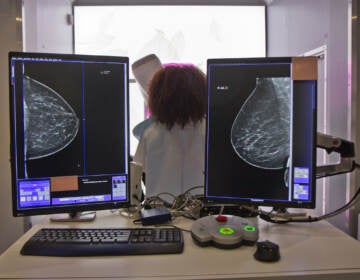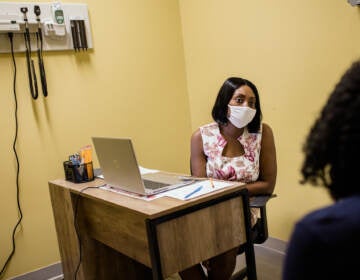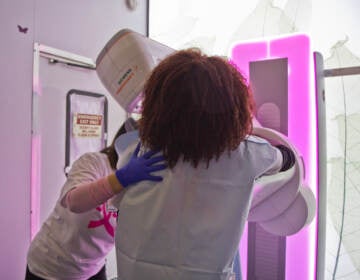Breast Cancer Awareness Month: New virtual program addresses racial disparities
Living Beyond Breast Cancer (LBBC) has rolled out a virtual online series designed to address racial health disparities.

Jamil Rivers, an advocate living with metastatic breast cancer, has spearheaded a virtual educational program offered by Living Beyond Breast Cancer, a national nonprofit organization. (Abdul R. Sulayman / The Philadelphia Tribune)
This story originally appeared on The Philadelphia Tribune.
Living Beyond Breast Cancer (LBBC) has rolled out a virtual online series designed to address racial health disparities.
The series was spearheaded by Jamil Rivers, who was diagnosed with metastatic breast cancer at the age of 39.
“It actually just stemmed from me mentoring other Black women with breast cancer and learning that Black breast cancer is its own subtype,” said Rivers, a board member of LBBC.
So she worked on establishing the Knowledge is power: Understanding Black Breast Cancer program which seeks to empower Black people diagnosed with breast cancer and their caregivers.
“Black women die [of breast cancer] at a 40% higher rate than their white counterparts and we really don’t know why,” said Jean Sachs, the president and CEO of LBBC.
“We felt like it was really important to dedicate an entire program on really addressing health equity, implicit bias and providing a tool kit and some skills on how do you become an advocate for your own health care. Our goal was to really reach women who are newly diagnosed.”
The new series will address disparities through virtual educational sessions and video content with advocates, oncologists, social workers and researchers. The online sessions will be held Oct. 8, 15 and 24.
“It’s just to empower patients to understand that the medical is just one part of it,” Rivers said.
October is breast cancer awareness month. The American Cancer Society estimates that one in eight women will be diagnosed with breast cancer in her lifetime. According to the organization, there will be about 276,480 new cases of invasive breast cancer in 2020.
Breast Cancer Prevention Partners, a science-based advocacy organization that works to prevent breast cancer by eliminating exposure to toxic chemicals and radiation said African American women have a 31% breast cancer mortality rate – the highest of any U.S. racial or ethnic group. Among women younger than 45, breast cancer incidence is higher among African American women than White women.
Rivers said it’s important for people to understand everything that goes into ensuring that they receive the best cancer care possible. This includes everything from understanding the different types of breast cancer and how they impact Black people, treatment side effects, navigating through financial and insurance concerns and dealing with racism in health care settings.
“If you get the best cancer care possible, then you’re less likely to be susceptible to disparities and you’re probably going to have a more likelihood of having a more positive outcome through this breast cancer ordeal,” said Rivers, who also works with the American Cancer Society and Komen Philadelphia.
Rivers noted that some Black breast cancer patients are encountering biases in the health care system which can impact their treatment.
“We have a lot of medical professionals that are functioning as gatekeepers in a sense,” she said.
“It’s not all hands on deck when it’s a Black person that is presenting and being treated for breast cancer. Sometimes their concerns are not being acknowledged. They’re not really offered the support resources that their white counterparts are.”
Dr. Monique Gary, a breast cancer oncologist at Grand View Health in Sellersville, is doing presentations on self-care and wellness and advocating for change in Black breast cancer care during the virtual series.
She said LBBC’s program is timely, particularly in light of the pandemic. The coronavirus has led to surgeries being placed on hold and women putting off being screened for breast cancer.
“Everything has been upended because of the coronavirus and that means that there has been a lot of misinformation as well,” said Gary, one of the few Black breast cancer surgeons in Pennsylvania.
“This is an opportunity for us to provide some accurate information about breast cancer specifically for Black women at a time when we’re starting to hopefully actualize the fact that Black lives matter. It’s not just a catch phrase.”
“It doesn’t just matter with respect to police brutality, but our lives matter, period,” she said. “And that means that our cancers matter. That means our screenings matter, our wellness matter, not just our diseases. So this is a key time to talk about what is new in breast cancer.”
Gary also said doctors could benefit from participating in forums like the series.
“I wish more doctors would tune in to conferences like this and learn from patients and learn from clinicians,” she said. “I wish more clinicians would tune in to figure out how to better partner with patients — how to better reach Black patients.”
Throughout her journey, Rivers has noticed that Black women have unique challenges when it comes to dealing with breast cancer such as being diagnosed younger. She recently encountered a woman who reached out to her because she had found a lump in her breast and had experienced difficultly in finding a health system that would cover the cost of screening her for breast cancer because she was only 35. She was ultimately diagnosed with cancer.
“This happens to Black women everyday,” Rivers said. “We’re diagnosed younger and we tend to have aggressive tumors and we’re still studying to figure why that is.
“We’re diagnosed metastatic more often than our white counterparts because of the fact of the delayed screenings and diagnostic work up or just the fact that we’re not aware of those warning signs.”
LBBC’s series comes as the American Cancer Society estimates that one in eight women will be diagnosed with breast cancer in her lifetime. According to the organization, there will be about 276,480 new cases of invasive breast cancer in 2020.
For information about the virtual series visit lbbc.org/knowledge
WHYY is your source for fact-based, in-depth journalism and information. As a nonprofit organization, we rely on financial support from readers like you. Please give today.





